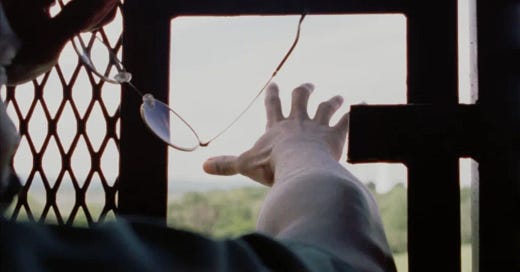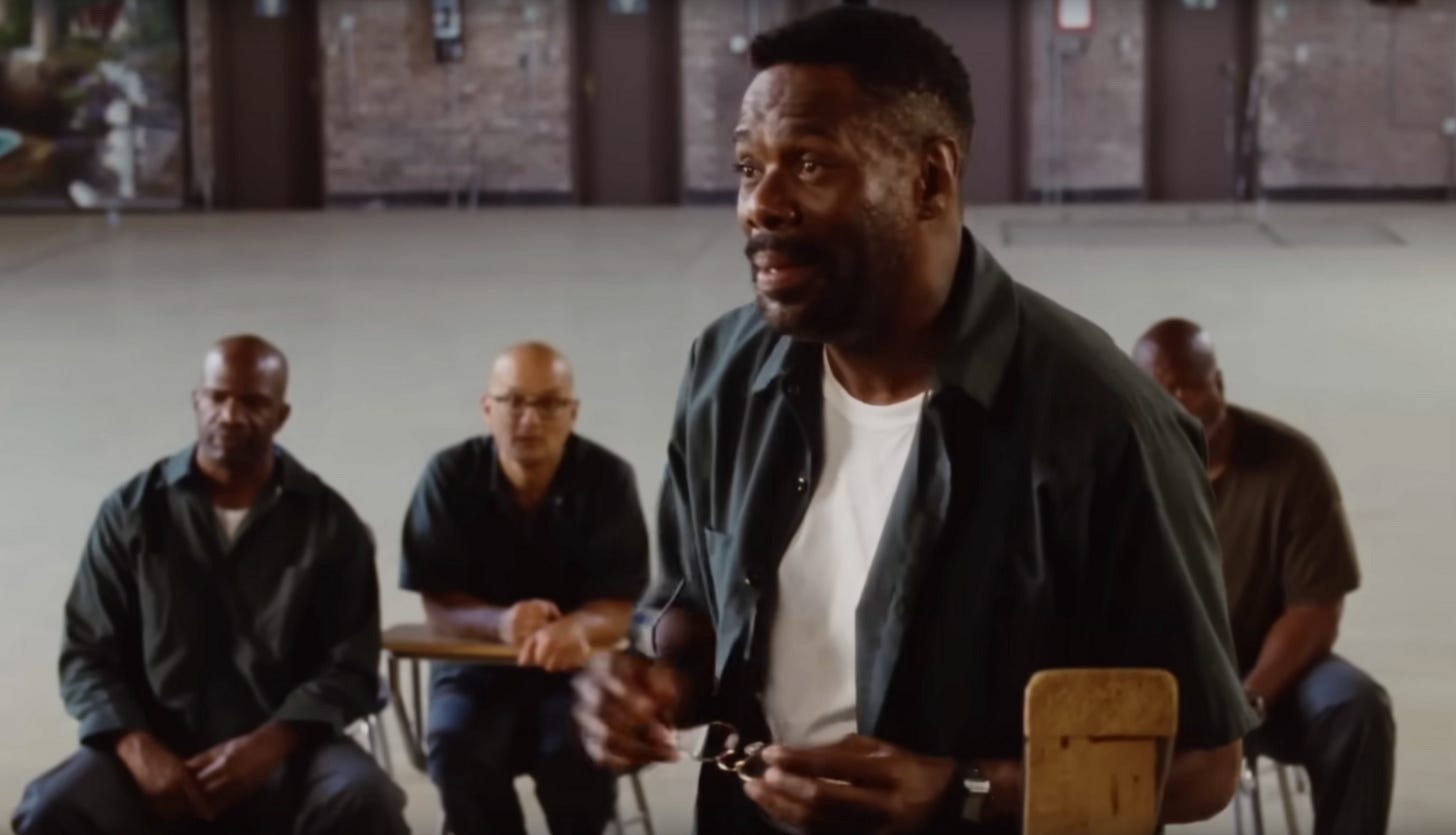Today, like most days, I want to talk about grief.
I first watched Sing Sing last year on a whim, in the middle of a bright and sunny afternoon in early September. All I knew was that Colman Domingo was the leading man, which was enough to get me to buy a ticket. After exactly one minute of idle contemplation on the sidewalk, I entered the air conditioned building, bought my ticket, and breezed down the aisles to pick the best seat in the house (middle to middle back). Because it was just me, an elderly white man, and absolutely no one else in the theater, I never anticipated that my world would be tilted on its axis that day. The theater was empty and quiet, still with silence.
I had zero expectations and no idea the next hour and forty-seven minutes would split me open the way it did.
On the surface, Sing Sing is a film about the incredible power of art as a form of rehabilitation.
But right underneath that, in the soft underbelly, is an intense chronicle of grief and all the ways we find ourselves again and again and again after loss. Loss of relationships, loss of freedom, loss of loved ones, and loss of humanity. Set against the most dehumanizing backdrop (Sing Sing Correctional Facility) we are reminded that there is value in staying hopeful; that imagining new realities and believing in yourself is not a feeble effort.
This film about incarcerated men reciting dramatic monologues to the rafters was so tender, so deeply moving, that I had to lay a hand on my heart from beginning to end. I remember it so vividly, sitting there alone save for the old man a few rows in front of me. The fabric of my t-shirt crumpled underneath my fingertips where I grasped for something, anything, to keep my most precious organs from falling out of my chest. These feelings I let lay dormant for too long, just begging to be set free. My own hand covered that sacred spot, but really it was the breadth of Colman Domingo’s voice as he delivered a grief-stricken third act monologue that cradled my soul in a firm embrace. My own attempt at self preservation was weak in comparison.
And so, against all feeble attempts at salvation, my heart lay bleeding on the dark linoleum floor; still beating and connected to my body as each quivering thump glowed under the illumination of the end credits scene. Where “as himself” appeared on screen and punctured my defenses, leaving me bereft.
I was left exposed and tender to the touch.
A portion of this tenderness comes from the booming declaration that incarcerated men deserve joy, humanity and art; not in spite of their circumstances, but simply because they are people.
During a tension filled scene, Clarence “Divine Eye” Maclin is expressing reservations about another castmate walking too close behind him while rehearsing for their upcoming play. He interrupts the scene, he yells, and from what I can remember he might’ve threatened the other man in some way. He does all of this, clearly, because he hasn’t reached the point yet where he feels safe enough to let his guard down. In his mind, they are still in the prison yard or cafeteria—where anything can go down in the blink of an eye and someone walking too close behind you is cause for concern. This moment is interjected by another castmate, who delivers the first line of the film that brought me to tears:
“We here to become human again.”
So often in popular culture do we see Black men depicted as angry, hypermasculine “thugs” incapable of softness that it has become a caricature not only in Hollywood, but an image that has seeped into the very subconscious of our community. In any other movie this moment might have ended in violence, because that is what we expect as the next natural reaction to conflict amongst Black men.
Instead, Sing Sing subverts these stereotypes not by shaming these men or claiming that this societal conditioning is beneath them, but by saying, “I know you are angry, you have every right to be, but the world wants you to stay angry and wrapped up in a cycle created in their image. Who will you choose to be when that violence no longer serves you? What kind of friend, father, man do you want to be? The world doesn’t want you to be tender, but what if you did it anyway?”
“Sometimes you don’t survive whole, you just survive in part. But the grandeur of life is that attempt. It’s not about the solution. It is about being as fearless as one can, and behaving as beautifully as one can, under completely impossible circumstances.”
—Toni Morrison
Upon seeing the film a second time, in a packed theater on a Sunday night in mid-January, all I could think about was grief— while fellow moviegoers expressed an appreciation for the RTA program and loudly boasted, “I can’t believe they were real prisoners!”
All I could think about was grief, and how it sticks to the walls of your skull like the smell of smoke on matted carpet.
I know grief, have laid in bed with it and shared sordid secrets under moonlit skies.
Grief is a symptom of death, you cannot have one without the other. Grief is a symptom of loss.
Prisons, by design, are meant to be devoid of all signs of real human life and thus, they too are death. They too symbolize loss. So how, against a literal death machine that strips you of your humanity, are these incarcerated men supposed to fully grieve?
The answer, in part, is how we all should be walking with grief.
I used to guzzle down grief like a sick child swallowing cherry flavored cough syrup, face pinched up in disgust and counting down the seconds until each bitter drop slid down my throat.
Now I sip on grief real slow, let it pool up underneath my tongue like a freshwater pond in the middle of an unforgiving forest.
To grieve is to breathe. To grieve is to be human.
Sing Sing shows us that in order to really live, you must hold hands with grief. You have to look your grief in the eye and say “I love you,” or else it will consume you. Grief is not to be conquered, or fought, but tended to with a gentle hand.
Grief is something beloved. Grief is something, beloved.
Thank you for reading <3
Go out there and watch this amazing film!





I was able to screen the film before it was released nationwide thanks to a friend of mine, the movie was truly beautiful from the cinematography to the acting. One concept that I loved was how the filmmaking process was democratized: everyone made the same amount of money, majority of the actors were actual inmates, and it showed that you don’t have to go through all these hoops to become a true thespian. It emphasized craft over anything else. Wonderful movie and wonderful piece.
Really loved this piece. Thank you for sharing your experience with the film…it has helped me create a container for my own experience.
Will have more to say, but it was a joy to interact with your writing.
pX